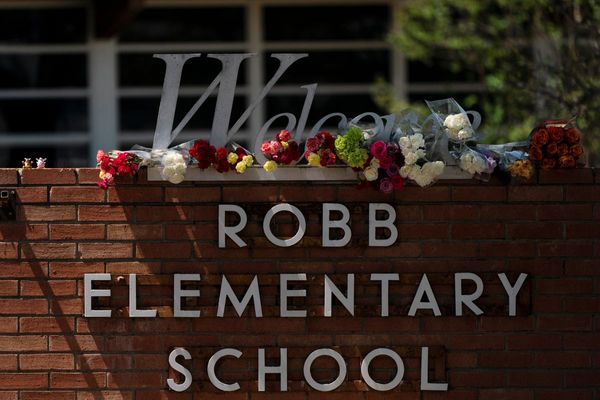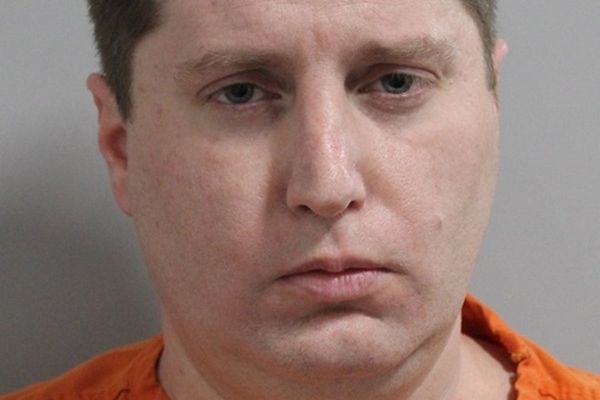
A federal judge recently dismissed two felony charges against two former Louisville, Kentucky, police officers who were involved in obtaining the search warrant for the 2020 drug raid that killed Breonna Taylor. In a ruling issued last Thursday, U.S. District Judge Charles R. Simpson III concluded that the Justice Department had failed to allege facts sufficient to support two felony counts against former Detective Joshua Jaynes and former Sgt. Kyle Meany under 18 USC 242, which makes it a crime to "willfully" deprive someone of his constitutional rights "under color of any law." But Simpson left in place several other misdemeanor and felony charges stemming from the no-knock warrant, which prosecutors say was not supported by probable cause.
Despite their no-knock warrant, the three plainclothes officers who approached Taylor's door around 12:40 a.m. on March 13, 2020, banged on the door before smashing it open with a battering ram. They said they also announced themselves, although that claim was contradicted by nearly all of Taylor's neighbors. Taylor's boyfriend, Kenneth Walker, was in bed with her at the time. He later said he heard no announcement and had no idea that the men breaking into the apartment were police officers. Alarmed by the banging and the ensuing crash, he grabbed a handgun and fired a single shot at the intruders, striking Sgt. Jonathan Mattingly in the thigh.
The three officers responded with a hail of 32 bullets, including six fired by Mattingly, 16 fired by Detective Myles Cosgrove, and 10 fired by Detective Brett Hankison, who was standing outside the apartment. Hankison fired blindly through a bedroom window and a sliding glass door, both of which were covered by blinds or curtains. Six of the rounds struck Taylor, who was unarmed and standing near Walker in a dark hallway. Investigators later concluded that Cosgrove had fired the bullet that killed Taylor.
Neither Jaynes nor Meany was involved in the raid itself. But Jaynes wrote the affidavit supporting the search warrant, and Meany, who was fired after his federal indictment, approved it. Jaynes, who was fired in December 2020 for lying in that affidavit, falsely claimed he had confirmed with a U.S. postal inspector that Taylor's former boyfriend, suspected drug dealer Jamarcus Glover, was receiving packages at her apartment. Jaynes later contradicted that account, saying Mattingly had "nonchalantly" mentioned that Glover "just gets Amazon or mail packages there." The packages reportedly contained shoes and clothing, consistent with what Jaynes knew about them a month before the raid. But in his affidavit, Jaynes intimated that the packages might have contained drugs or drug money. And although he was seeking a no-knock warrant, he failed to cite any evidence specific to Taylor that would have justified dispensing with the knock-and-announce rule.
An August 2022 federal indictment alleged that Jaynes and Meany "knew that the affidavit used to obtain the warrant to search Taylor's home contained information that was false, misleading, and out-of-date; that the affidavit omitted material information; and that the officers lacked probable cause for the search." It added that they knew "the execution of the search warrant would be carried out by armed [Louisville] officers" and "could create a dangerous situation both for those officers and for anyone who happened to be in Taylor's home."
Based on those allegations, the indictment charged Jaynes and Meany with "aiding and abetting" a violation of Taylor's Fourth Amendment rights, which by itself is a misdemeanor punishable by no more than a year of incarceration. But the indictment added that "the offense involved the use of a dangerous weapon," which increases the maximum sentence to 10 years, and "resulted in Taylor's death," making it punishable by up to life in prison or the death penalty.
The indictment also alleged that Jaynes and Meany tried to cover up the lack of probable cause for the warrant by "submitting a false Investigative Letter" and "making false statements to criminal investigators." Based on those allegations, it charged them with conspiring to violate 18 USC 1519, which makes it a felony, punishable by up to 20 years in prison, to obstruct an FBI investigation.
Jaynes and Meany also were charged with violating 18 USC 1512(b)(3). That statute makes it a felony, likewise punishable by a maximum 20-year sentence, to knowingly "engage in misleading conduct toward another person" with the intent to "hinder, delay, or prevent the communication to a law enforcement officer or judge of the United States of information relating to the commission or possible commission of a Federal offense."
Based on the investigative letter, Jaynes was charged with falsifying records in a federal investigation, which under Section 1519 is punishable by up to 20 years in prison. Meany was charged with "knowingly and willfully" making a false statement to federal investigators when he told an FBI agent that the Louisville Metro Police Department's SWAT division had "asked for no-knock authority" in executing the search of Taylor's apartment. That is a felony punishable by up to five years in prison under 18 USC 1001.
Simpson left nearly all of these charges in place. But he concluded that the alleged facts did not support the claim that Jaynes and Meany had aided and abetted a Section 242 violation involving the "use" of "a dangerous weapon," which would turn a misdemeanor into a felony.
The indictment "alleges that Taylor was subjected to a deprivation of her Fourth Amendment right to be free from an unreasonable search," Simpson writes. "Thus, to convict Jaynes and Meany of aiding and abetting the use of a dangerous weapon to commit this crime, the Government must prove that the Execution Team used their firearms for the purpose of subjecting Taylor to the search. The Indictment does not do
so. Instead, the Indictment does no more than allege that Jaynes and Meany knew the Execution Team would be armed. Simply possessing a firearm, however, is not 'use' under § 242.38. Instead, 'use' means actively employing a weapon. The only active employment of a weapon alleged in the Indictment is 'use' for self-defense, i.e., returning [Walker's] fire. There are no allegations which suggest that the Execution Team used their guns to subject Taylor to the search. The Use Charge will be dismissed for this reason."
Simpson also rejected the claim that the alleged Fourth Amendment violation resulted in Taylor's death. Even if the search warrant had been valid, he reasons, the outcome would have been the same.
Walker "did not respond to the act of entry without probable cause," Simpson writes. "He responded to the manner of entry." The judge notes that "a midday, announced entry" would not have caused Walker "to believe he needed to fend off intruders." In fact, he says, "the Government takes pains to stress that [Walker] fired only because he believed the police were intruders….That is, but-for [Walker's] being frightened into opening fire, Taylor would still be alive. Assuming it was warrantless, the entry constituted a Fourth Amendment violation, but, standing alone, the fact that the entry was invalid was not the actual cause of Taylor's death."
Nor was the allegedly invalid search warrant the "proximate cause" of Taylor's death, Simpson concludes. "To state a case for the death-results penalty enhancement, the Government must allege facts which, if true, would permit the conclusion that Taylor's death was the natural and probable consequence of the lack of probable cause to enter her apartment," he writes. "It has not done so."
The government "has not explained how the lack of probable cause to enter created a
foreseeable risk of a gunfire exchange," Simpson writes. It "does not explain how the gunfire was the natural and probable consequence of lacking a valid warrant." Instead, he says, "the Government argues that the gunfire exchange was a foreseeable result of the late-night, surprise manner of entry….The key here is the 'late night' surprise, according to the Government. That manner of executing the warrant created the risk of death, not the lack of a valid warrant. The Government's argument fails to recognize the distinction, conflating manner-of-entry issues with invalid entries."
Jaynes and Meany still face the misdemeanor Section 242 charge, which hinges on the alleged Fourth Amendment violation. And they still face all of the felony charges under the other statutes.
Detective Kelly Goodlett, who was accused of "conspiring with Jaynes to falsify the search warrant for Taylor's home and to cover up their actions afterward," pleaded guilty a few weeks later. She said Jaynes had never verified that Glover was receiving "suspicious packages" at Taylor's apartment.
Walker initially was charged with attempted murder of a police officer, but local prosecutors dropped that charge two months later, implicitly conceding that he had a strong self-defense claim. In September 2020, Kentucky Attorney General Daniel Cameron rejected criminal charges against Mattingly and Cosgrove after concluding that they also had acted in self-defense. Louisville's interim police chief, Yvette Gentry, dismissed Cosgrove three months later, saying he fired "in three distinctly different directions," which indicated he "did not identify a target" and instead "fired in a manner consistent with suppressive fire, which is in direct contradiction to our training, values and policy."
Hankison, who was fired three months after Taylor's death because of his reckless shooting, was the only officer to face state criminal charges in connection with the raid. He was charged with three counts of wanton endangerment in September 2020 but acquitted by a state jury in March 2022.
On the same day it announced the federal charges against Jaynes and Meany, the Justice Department unveiled an indictment charging Hankison with willfully violating the Fourth Amendment under color of law by blindly firing 10 rounds through "a covered window and covered glass door," thereby endangering Taylor, Walker, and three neighbors in an adjoining apartment. Hankison's federal prosecution ended with a mistrial in November 2023 because the jury could not reach a verdict. Prosecutors plan to try him again.
The post Why a Federal Judge Dismissed 2 Felony Charges Stemming From the Drug Raid That Killed Breonna Taylor appeared first on Reason.com.







